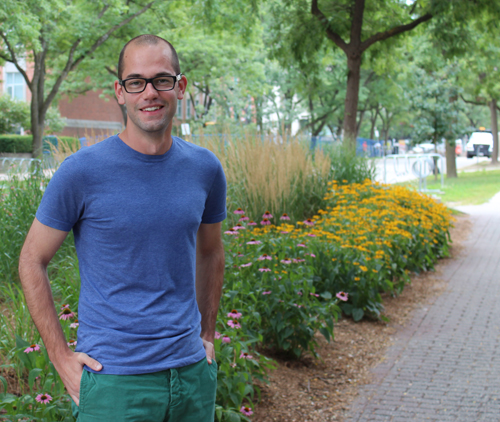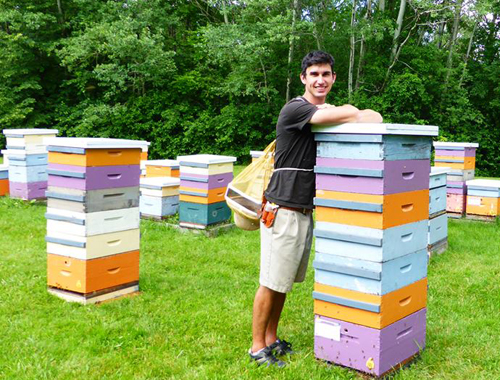By Maggie McCormick, summer intern in the Ontario Agricultural College communications office

For most students, summer is a break from attending class and studying, but just because their formal education is on hold doesn’t mean all students want to pause their learning. Working on campus is a popular and rewarding route for students who want a summer job that will expand their knowledge and equip them with career-advancing skills through experiential learning.
Christian Stewart, a third-year bachelor of landscape architecture major, is one of these students, and his role as an undergraduate research assistant in the School of Environmental Design and Rural Development this summer fits the bill perfectly.
While assisting PhD candidate Ataharul Chowdhury, Stewart has been involved with data collection and survey construction to examine relationships between agricultural stakeholders, innovation and social media.
“What I like about this job is that I am being introduced to another discipline,” Stewart says. “I have never worked within the broader umbrella of capacity development and extension before.”
Agriculture and Twitter may seem like a bit of a leap from landscape architecture studies, but Stewart says working on this project has not only exposed him to new subjects but also helped him see how these fields influence his own.
“I think it is important for the landscape architect to help facilitate agricultural landscapes that are resilient and sustainable, especially close to home,” he says.
While his summer work experience is unique, he’s not the only student getting hands-on experience and discovering new interests from May through August. This year, the Ontario Agricultural College employed 335 summer students across its four campuses and six academic units.
These summer students benefit from the employment and the experience they gain — and of course the salary — but OAC dean Rob Gordon points out another benefit. “These positions that OAC provides are vital to the important research our faculty, staff and graduate students conduct,” he says. “These 335 summer positions directly influence the quality and quantity of the research that our college is able to carry out.”
For some of OAC’s academic units, student work is necessary to carry out more labour-intensive research, especially when it concerns field trials or caring for animals.
Patrick Boelsterli helps care for the well-being of thousands of tiny insects as a research assistant and beekeeper at the Honeybee Research Centre in the School of Environmental Sciences. He says his responsibilities vary from day to day and involve everything from assisting research students, managing colony health and extracting honey later in the summer.

Boelsterli will begin working on his doctor of veterinary medicine at the Ontario Veterinary College this fall. Although he’ll be learning about larger animals, he says his time at the apiary has given him some important skills.
“A lot of my job involves assessment of colony health and disease diagnosis,” he says. “As a vet, I may not directly work with bees, but the skills involved in assessing health are certainly relevant.”
These skills are exactly what Gordon hopes students will gain from their experiences working on the campuses or research stations.
“There is a high demand for the graduates of our programs, and we want to ensure our students are as prepared as possible for their future positions in industry, government and research, or even to support the development of individuals concerning further academic training,” Gordon says. “Experiential learning is an important part of OAC programs, and summer jobs are another means to provide hands-on learning opportunities to our students.”
Hilary Eatock, a fourth-year natural resource management student, is also preparing for her future through her job in the Department of Plant Agriculture’s weeds lab.
“This job is related to a future career I am interested in,” she says. “I’m very interested in a managerial position in relation to agriculture environmental policies.”
After graduation, Eatock is heading to Queen’s University for a master’s of public administration to pursue the policy part of that goal. Her studies at Guelph and her summer job as a research assistant in the weeds lab gave her an up-close perspective on agriculture. Understanding the work that is necessary in research and agriculture will be an asset she can apply on the management side of the industry. “I felt I could gain valuable insights from this job experience,” she says.
Developing insights and skills for the future are important, but enjoying your summer job always helps. “I really love being outside and getting to enjoy the summer heat,” says Eatock. “There’s not much that I have encountered that I don’t like,”
Boelsterli says he feels the same way about his job, but there is one thing he isn’t very fond of. “I guess getting stung by bees isn’t something I really enjoy,” he says. “But it’s an occupational hazard that makes for great stories and makes me look really tough to my friends.”